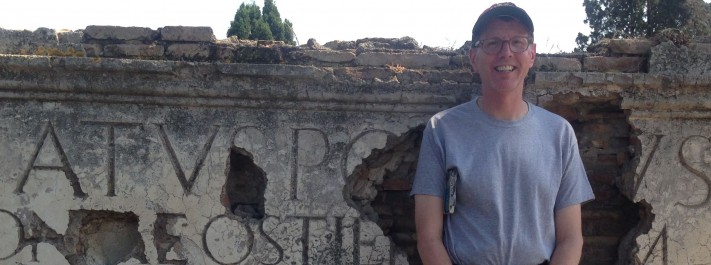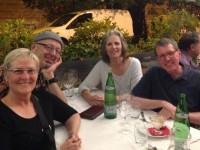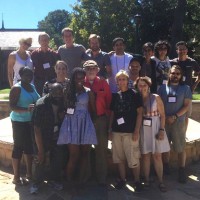
Whether as an artist-in-residence in Italy or during self-directed sojourns to the North Shore, Gary Peter, Senior Teaching Specialist in PsTL, reserves summer vacation to further his vocation as a creative writer.
It’s a practice he began while finishing his MFA in Creative Writing at Sarah Lawrence College, prompted by the welcomed parental directive of his thesis advisor. Peter recalls her guidance: “Well, the next thing you have to do is go to a residency.” That summer he spent three weeks at the Virginia Center for the Creative Arts, a place his former advisor still attends. Every year Peter seeks out at least one or two residencies a summer. “You apply. You hope you get in,” he states humbly.
In 2015, Peter secured two, highly coveted and prestigious appointments: One as a Visiting Artist at the American Academy in Rome, and the other, an invitation to the Sewanee Writers’ Conference hosted by the University of the South in Sewanee, Tennessee. His summer goals were to complete a fifth draft of his novel about dairy farm life, and garner inspiration for a story partially set in Rome.
Exploring in Rome
During his residency, the open structure of the American Academy’s program granted Peter the freedom to explore his craft and Italy’s capital. “I would try to use the mornings for work, for writing,” says Peter, choosing the Academy’s sun-lit, wood-paneled library filled with architecture and art history volumes over his monastic private quarters. In the afternoons he toured the city. “I had the space to experience things. To take the risk of exploration, a kind of willingness to let yourself get lost.”

Peter met up with another visual artist at the Academy who guided him on tours of churches she came to Italy to visit. While trying to locate a particular church, a city resident walking his dog kindly offered directions, but also clued them into a lesser-known local treasure. “The church wasn’t in any guide books and wasn’t on Hilary’s extensive list. We just stumbled upon it,” Peter remembers. “It was very austere, with frescos you could tell were quite ancient. And, no one else was there, just us.” In the simplicity and solitude, the pair embraced a profound sense of peace amid the bustling, tourist-filled city outside. “We spent an hour there because we couldn’t tear ourselves away. It was just so beautiful.”
This unexpected delight triggered reflection for Peter. “In terms of my own writing, I’m always trying to manage it and control it,” he admits. “I still think of that church, and our chance of finding it.” His experience demonstrated the value of surprise in writing, and in life. “It’s kind of the same, letting go of the need to control things in your environment.”
Fully scheduled in Sewanee
In contrast to Rome, at the Sewanee Writers’ Conference time is earmarked sun up to sun down with craft lectures, workshops, readings and receptions. Picture an intellectually themed, adult summer camp for prize-winning and promising poets, fiction writers and playwrights. Instruction from the distinguished Conference faculty, along with editors and agents, encompasses the literary spectrum from idea development to publishing, and benefits writers with a cross-pollination of disciplines. “The playwright Paula Vogel gave the most amazing lecture on playwriting, but so much of it was relevant to writing in general,” Peter says. “She’s an incredibly dynamic person.”
At open readings, writers shared their work with attendees in the cheerful atmosphere of the campus pub. Despite being a bit unnerved by the prospect, Peter took the plunge. “I read a very short piece, and it went over really well. People came up to me afterwards and said, ‘I didn’t know you were so funny,’” says Peter.

At Sewanee, workshops were held every other day and off days were spent reading for the next. “There were fifteen people in my workshop and each person had their work read and critiqued by the entire class,” Peter recounts. The peer review was augmented by a one-on-one conference with the workshop faculty that Peter found highly useful, although a challenge to his novel draft deadline before classes start. “I came away from Sewanee thinking, ‘Boy, that was really good, but I still have a lot of work to do.’”
A personal choice
Peter’s commitment to summer residencies and writing retreats originates from his early experience and demanding teaching schedule during the academic year. He values the minimal distractions, space and support of regular meals, but he realizes the practice is not for everyone. “I have writer acquaintances and friends who do just fine writing from their kitchen table,” he says. “For some people it’s wonderful, and for others it’s very intimidating to not have structure. You need to be open to the time, but also have a sense of what you want to do with it.”
Recognizing talent
During the school year in his academic writing courses, Peter wants to encourage creativity but also be mindful of the expectations and conventions of research-focused writing. When opportunities for voice and reflection present themselves, Peter looks for moments when he can help students realize their abilities. “When I can say to someone, ‘You write with a great style.’ That’s always nice when that happens.”
Perhaps sharing the gift of recognition is exactly how the judges of the highly esteemed 2015 Flannery O’Connor Award for Short Fiction feel about Peter. His collection, Oranges, was shortlisted for this year’s honor.




